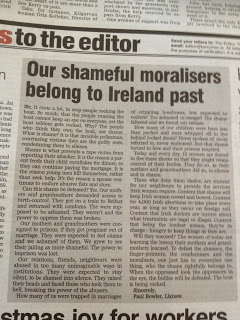(This is an article that the good people over on ramp.ie were kind enough to publish on their site)
If there is one thing that can be said about Chief Petty Officer, Miles O’Brien, is that he is not always Politically Correct. He may be able to make friends with an upper-class Arab, with an English Public School accent, but when it comes to Cardassians, it’s Cardie this and Cardie that. He really does not like them. He is not wholly above flirting with a pretty Cardassian (even if he maintains it was inadvertent), but generally, Cardassians cannot be trusted. He even killed a few of them, back on Setlik III.
Not very United Federation of Planets. Is it possible that this prejudice is such, that if Quark had a holosuite programme of Bernard Manning telling Cardassian jokes, Chief O’Brien would attend? Would he laugh? Would he take Keiko? Would he laugh as this holographic projection of Manning, inserts Cardassian into the place of black, paki, nigger, darkie, paddy and any other racial epitaph Manning delighted in, and grew rich in the use of?
Not likely. Chief O’Brien may not be always Politically Correct, but he is never hateful. He is also an engineer. He likes to work out how things tick. And he would recognise the genius of Manning. An excellent joke-smith, tapping into the latent (and not so latent) fears of his audience. There is a chance that the good Chief may titter a few times at the beginning of the routine, but he is an enlightened person. Soon he would be demanding his Latinum back from Quark. And if he was on the Enterprise, he would most likely book a session with Counsellor Troi.
What then would his response be to Quark selling him a Frankie Boyle holosuite experience? He would hear the same words used by Manning, but O’Brien would notice a qualitative difference. Boyle would make vicious jokes about Cardassians, but he would follow them with jokes about the religiously freakish, Bajorans. Even the fifty million or so Bajorans, killed during the Occupation would merit mention and mocking. O’Brien would be conflicted. Boyle would now be explaining that The Federation is so effete and liberal, that it would find some way to buy off the advances of The Founders, with sexual favours.
O’Brien would also hear the C-word used more often in that thirty minutes than he would have had all his life to that date, even having been born in Ireland. He is a soldier though, so he sensibilities would not be overwhelmed. He might even begin to laugh, understanding the fun there can be in undirected and scatological bile. Understanding how much stress relief there can be in laughing at things one shouldn’t laugh at. Then Boyle would tell a joke about Miles and Keiko losing their daughter, Molly, through an energy vortex. It would take weeks for the holosuite repairs to be completed.
And when repaired, Quark ever the trier, would take one last punt at finding a comedy programme O’Brien would enjoy. He would try Sarah Silverman. An understandably cautious O’Brien would not like what he was hearing. Again, many of the same words and phrases used by Manning and Boyle would litter Silverman’s routine. And O’Brien would be distracted by the sound of Jadzia Dax laughing so hard, she must lean on a grimacing Worf for support.
Why Silverman and not Manning or Boyle, he would be forced to ask? Silverman would tell the following joke; she imagined having to tell her parents she had married Worf. How would she tell them he was Klingon? It’s not that her parents are racist, they are, but why couldn’t she pick an alien from an honourable house? So she decides to emphasise his blackness instead, because he at least has a job.
Worf would storm out and Dax would be laughing too hard to follow him. It would only be then that it would dawn on O’Brien, why Silverman is a true genius and not someone peddling the reheated dregs of Manning’s imagination or the deliberately shocking humour of Boyle. O’Brien would see that Silverman takes on the persona of a cute, coquettish Manning, tells Manningesque jokes, but makes the real target, her persona.
Every racist, sectarian, sexist, homophobic joke she tells, has at its target, the type of person who misses Manning. Misses his ‘brave‘ attacks on the powerless. Misses being able to tall ‘paki‘ jokes without threat from the PC Brigade. Misses having Page Three girls plastered all over the walls at work. Misses being able to hate the ‘queers‘ openly and loudly. Silverman takes on the persona of a vacuous monster, because only a vacuous monster can hold to the views espoused by Manning and his knuckle dragging fans.
O’Brien would also have to appreciate that Silverman, provides the shocks that Boyle does, but in a context that is useful, rather than merely amusing. Yes she says terrible things that make one wonder if laughing is right, but the target is never a victim, the target is always a perpetrator of hatred. Boyle is not a racist, but he is a purveyor of empty calories.
O’Brien would appreciate this. He mightn’t enjoy it, but he wouldn’t ask for his Latinum back. He would however ask Quark to try getting him a John Bishop programme for the next time.




